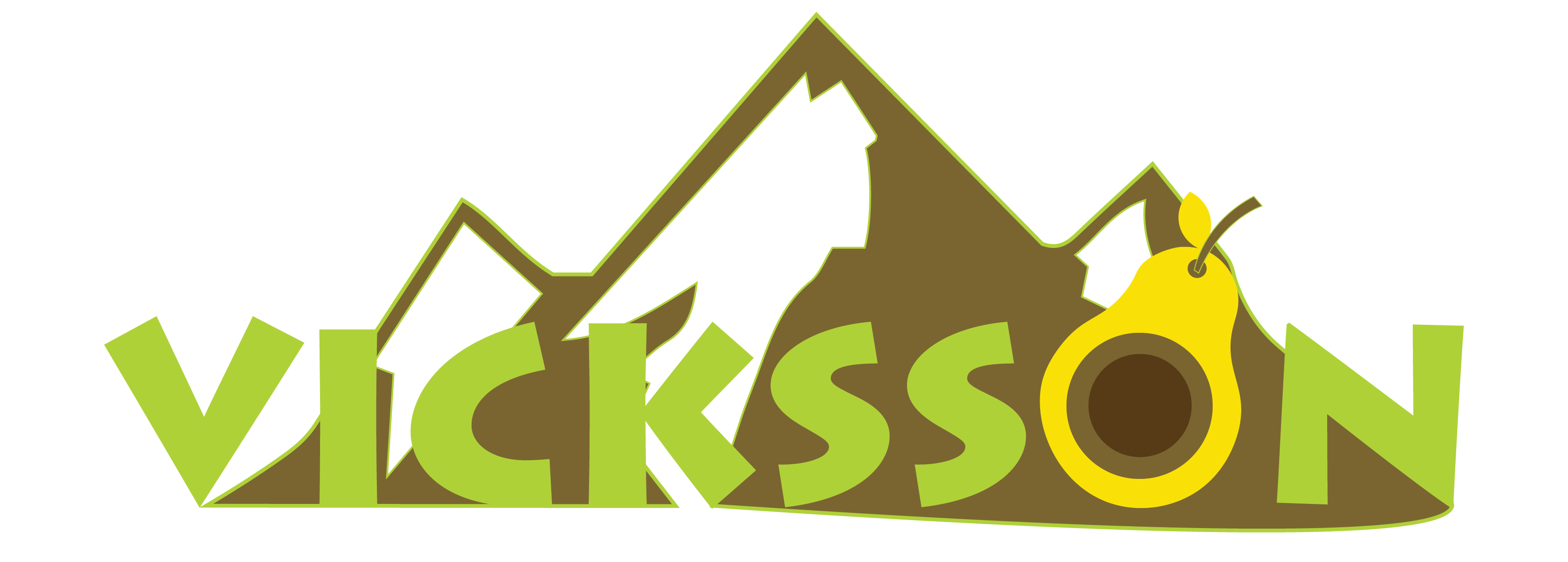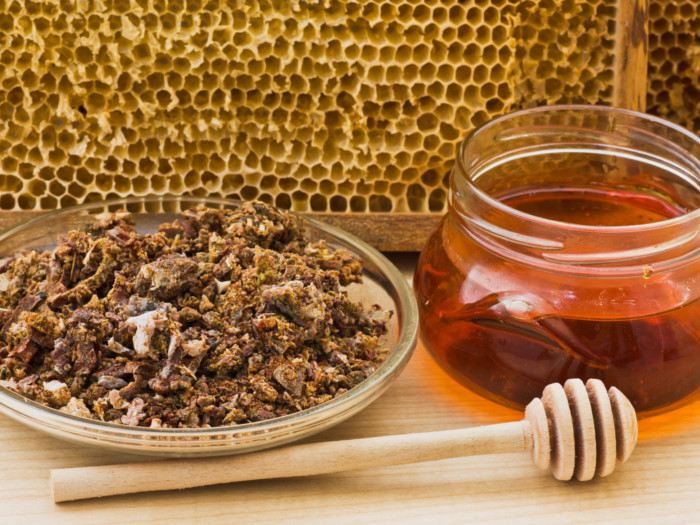The word propolis comes from the Greek: pro, which means: forward, and polite: city or city. The word describes the action of the bees who “amass before the hive” the city” the propolis by reducing the entrance to defend the colony. Propolis is actually defined as a great whole series of gummy, resinous, as well as balsamic substances of viscous consistency, collected by bees on plants.
Propolis’s Origin
Propolis is harvested by bees on the buds of certain plants such as alders, birches, willows, elms, oaks, but especially on poplars. You can also find propolis on the bark of softwood trees such as pines, firs, or spruces. And the composition of propolis varies according to the plant species present but also according to the season, the climate, and the geographical environment.
The resin that serves as the basis for propolis is transported by the worker bee on its hind legs and brought back to the hive. Unlike pollen, the resin is not stored but coated on the entire hive to ensure its asepsis, ie to protect it against infectious germs (such as parasites, bacteria, microbes) and other types of aggression.
It can also be used for the arrangement of the hive, that is to say, to seal cracks and repair the cells, as well as the mummification of large animals, such as rats.
Propolis Has Been Used Since Antiquity
Propolis, whether in pure or liquid form, has been known for more than 3,000 years. It was used in ancient times in the treatment and prevention of respiratory diseases. Thus, for the Greeks and Romans, it was a product highly valued for its antiseptic and healing properties.
Propolis was also used by the Egyptians for the preparation of ointments and the mummification of the dead. Egyptian doctors also used it to fight bacteria, while the Romans used it during conflicts to heal wounds, reduce pain, and clean wounds.
Another example of propolis use was the healing of wounds caused by arrow fire during the middle Ages. Over the past two centuries, propolis has been replaced by antibiotics and other drugs. However, its effectiveness in the field of the calming of respiratory diseases and the stimulation of the immune system has found new interest in the last twenty years.
What Are At The Top 6 Health Benefits Of Propolis?
1. It Strengthens The Immune System
With a very complex composition, propolis stimulates the formation of antibodies and contributes to the absorption of nutrients in the body. It is very effective in maintaining a healthy immune system. As a result, propolis can be used in winter as well as in spring or fall, when our immune system is in greater demand, helping to combat seasonal diseases such as the flu or colds.
Propolis contains antibiotic herbs as well as many chemical elements that the body needs to stay healthy: flavonoids, carbohydrates, vitamins (A, C, E, PP), trace elements (sodium, potassium, magnesium, calcium, aluminum, zinc, iron, chromium, manganese, copper, etc.), amino acids, pollen, waxes, resins, balms and volatile oils.
2. It Allows Treating Seasonal Affections
Propolis can prevent and reduce cold-related conditions, such as a sore throat. Indeed, thanks to its antibacterial and anti-inflammatory properties, propolis successfully fights viruses, preventing the appearance of symptoms. In addition, it is also a recommended natural treatment for pharyngitis, laryngitis or tonsillitis.
A study of a group of children in a school throughout the winter found that children treated with propolis developed fewer colds. Propolis thus helps to protect the body in case of respiratory viruses, easily transmitted from one child to another, especially when they are in the community (crèches, schools). This natural food is, therefore, a very effective therapeutic treatment, within reach of mothers who want to protect their children.
3. It Eliminates And Relieves Oral Problems
The protective, antiseptic and anti-inflammatory action of propolis makes this product very useful in the treatment of candidiasis, gingivitis, dental abscess, periodontal disease or gum disease and helps relieve dental pain. In addition, because of its antibacterial properties, propolis can disinfect the mouth and prevent the development of dental plaque, protecting the teeth against cavities.
For example, in the prevention of periodontal disease, it is advisable to mix 40 drops of propolis extract in 50 to 100 ml of water for use to rinse the mouth for a few minutes.
4. It Relieves Gastrointestinal Disorders
Until recently, ulcers and gastritis were less common than they are now. Today, they have become a major problem for humans because of unhealthy diets, excessive coffee, alcohol, and tobacco, as well as irregular sleep. Add to that the bacterium Helicobacter pylori, responsible for most stomach ulcers.
It is possible to treat ulcers and gastritis naturally with propolis. Known as one of the most powerful natural antibiotics, propolis has an anti-inflammatory, antispasmodic effect; it regulates the secretion of gastric juice and contributes to the healing of lesions of the gastric mucosa. In addition, unlike traditional antibiotics, propolis causes no discomfort in the stomach and no side effects.
5. It Helps To Heal Burns
Propolis naturally stimulates the repair of tissues damaged by cuts, wounds and especially skin burns, while accelerating the regeneration of healthy cells. In case of burns, propolis also acts as a disinfectant.
The many qualities of propolis have been observed after several experiments that have concluded that it is as effective as drugs in the treatment of second-degree burns. It is, therefore, a gentle therapy in addition to treatment for minor burns.
6. It Prevents And Helps Treat Ear Infections
The antibacterial effects of propolis have been demonstrated in various scientific studies that have highlighted the ability of propolis to prevent many types of infections, including middle ear infections. it has been shown that taking propolis in addition to zinc can significantly reduce the risk of a new episode of otitis.
Neglecting otitis or not treating it can damage hearing in the long run and propolis is a very effective treatment for preventing and curing the disease. It is advisable to soak a cotton pad in tincture of propolis and enter it into the ear canal to treat the infection.
Conclusion
Thanks to propolis health benefits and virtues, propolis is a product of the hive that could almost be described as miraculous: each of its components is full of nutritive, antibacterial, antioxidant or antifungal qualities and nutrients essential to the human body. Its uses are very numerous and their effectiveness is no longer to prove. The properties of propolis and their benefits on the human body have surely not finished talking about them!


Thanx for the effort, keep up the good work Great work, I am going to start a small Blog Engine course work using your site I hope you enjoy blogging with the popular BlogEngine.net.Thethoughts you express are really awesome. Hope you will right some more posts.